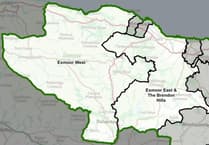WILLITON'S retail centre is likely to be hit by shop closures and a loss of investment if controversial plans for a new supermarket development on the edge of the village get the go ahead.
West Somerset Council's planning committee will be asked to decide the future of the scheme proposed by local businessman David Gliddon at a meeting on Thursday.
And the council's deputy planning manager Kenneth Taylor is recommending that the development which has divided opinion in the village should be refused.
The plans for a supermarket just under half the size of Minehead's Morrisons on a 1.5 hectare site that includes Mr Gliddon's existing agricultural machinery business, would include a number of smaller retail units, offices, three flats, a 175-space car park and a mini roundabout, along with a pedestrian link to Fore Street.
But in a report to the committee Mr Taylor has concluded that the supermarket element of the scheme would have a significant adverse impact on the vitality, viability and health of the village's shopping heart.
And he said it would result in a significant financial impact on the trade and turnover of existing shops, taking into account the lack of need for additional convenience retail floor space.
It would be "likely to result in store closures and impact on investment in the centre," he said.
"Such an impact would result in reduced consumer choice and competition."
Mr Taylor said he did not believe the benefits - reduced loss of trade to other retail centres and shorter shopping trip journeys - outweighed the adverse impact.
And he also highlighted the importance of the site - which already has planning permission for a significant number of homes - in meeting the district's future housing demand.
The scheme, first unveiled by Mr Gliddon two years ago, has sparked a fierce debate locally, with objectors concerned that Williton would lose its diverse mix of retail outlets and supporters insisting that shoppers needed more choice, cheaper prices and the estimated 150 jobs that would be created.
In his report Mr Taylor said the proposal had led to a total of 532 written comments from the public - 393 against and 139 in favour.
In addition, the council had received two petitions objecting to the scheme with a total of 3,403 signatures.
Williton Parish Council also objected, while Watchet Town Council raised concerns about the potential loss of trade in its town and the additional traffic likely to be generated on the A39 as a result of the supermarket.
However, although highways chiefs admitted the development would be likely to lead to more delays through Williton at peak times, they concluded the impact would not be severe enough to warrant a refusal.
Planning committee members will be told at their meeting that because of the specialist and technical nature of planning policy considerations, the council sought specialist retail advice from an independent consultant.
His conclusion was that the authority faced a choice - maintain the existing facilities in Williton and accept the continued leakage of some shopping trade to surrounding settlements, or provide a wider range of retail products, shorten some shopping trips but accept this was likely to lead to the closure of existing stores and have an effect on the health of the village centre.
But he said the benefits of the proposal, although significant, were largely wider and not directly beneficial to Williton.
So from a retail perspective, the adverse impact outweighed any benefits.
However, in his conclusion, Mr Taylor said that if councillors felt differently and that the benefits outweighed the harm to the village centre, a package of conditions would be needed to limit and mitigate the impact.
These could include new signs to direct shoppers from the supermarket to the centre, free parking to give visitors enough time to visit existing shops and money to enhance the area.




Comments
This article has no comments yet. Be the first to leave a comment.